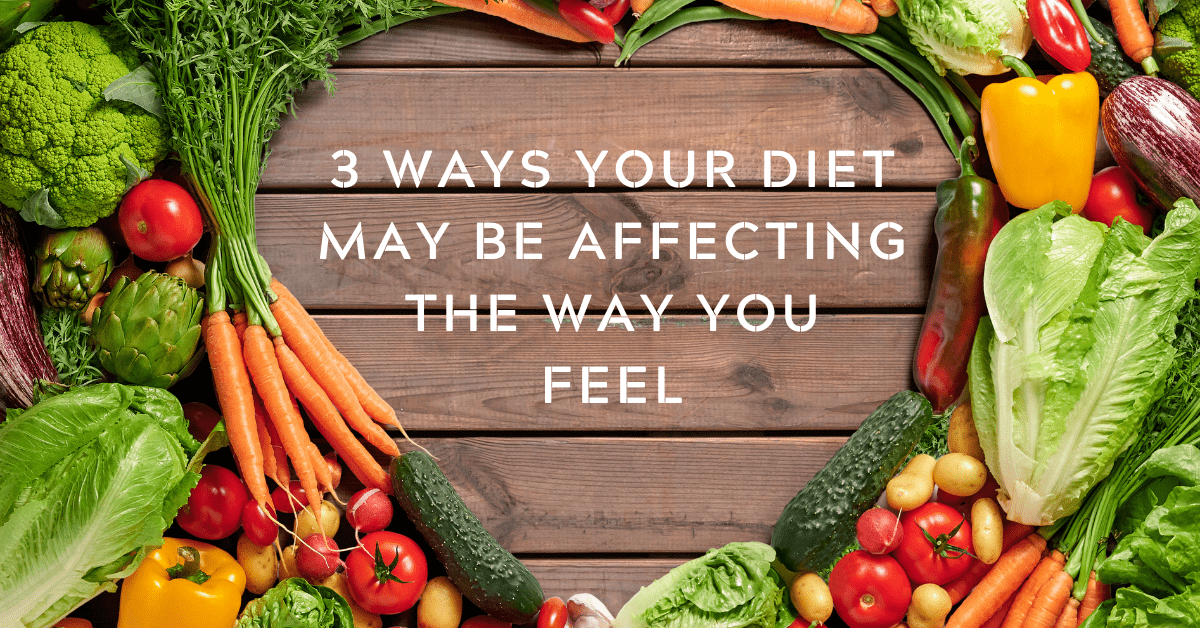What if your diet is keeping you from getting better? Most of us are pretty comfortable with the idea that what we eat affects our weight and long-term health, but a growing body of research shows that food can have a much more immediate impact on how we feel. Just like professional athletes and bodybuilders use specific diets to build muscle and maintain their performance, you can relieve – or aggravate- aspects of your health through food. That includes people struggling with their mental health or recovering from certain brain injuries.
Today, we’re going to talk about three common health challenges we see Veterans and Service Members struggle with and how the right foods can help you achieve better outcomes. While this is far from an exhaustive resource on the subject, we hope this serves as a great jumping-off point for you to start making positive changes.
Editor’s Note: While we’ve based this article on numerous academic studies and well-established science, we are not health or nutritional experts. We always recommend making healthy lifestyle changes while consulting with your healthcare provider to manage your physical and mental health best.
Brain Injuries and Mental Health
Your brain is just like any other organ or muscle in your body; its needs calories and nutrients to function well. When it doesn’t get enough of the right fuels, it can start impeding your normal brain functions and keep it from healing naturally from injuries, such as a concussion. For those struggling with depression or just having a hard time enjoying everyday life, you may also be suffering from low levels of serotonin and dopamine, two natural chemicals that help your feel more relaxed and happy. In addition to many healthy foods stimulating the production of both, research by Harvard Health suggests 90% of our serotonin receptors are in our gut.
So what should you be eating to build a healthier, happier brain? Just like every other aspect of your body, your mental health will benefit from a balanced diet full of vitamins, nutrients, and plenty of water. More specifically, your brain benefits from foods that are high in protein or contain omega-3 fatty acids. Your brain breaks down protein to heal itself and stabilize your blood sugar levels, which has been shown to improve anxiety and depression.
What Can I Eat for Brain Health?
- Fish
- Olive Oil
- Nuts and seeds (such as almonds and pumpkin seeds)
- Veggies like broccoli, spinach, and tomatoes
- Fruits like Blueberries and apples
Frequent Headaches and Migraines
If you find yourself experiencing headaches or migraines several times a week, your diet might have something to do with it. While stress and lack of sleep can also be frequent culprits, 20% of people suffering from either have food sensitivities. In basic terms, these are specific ingredients or food preparations that your body doesn’t like. The problem is, there are a lot of common food sensitivities, here are just a few to prove the point:
- Alcoholic beverages
- Pickled foods
- Potato chips and other processed foods
- Coffee and other caffeinated drinks
- Dairy
- Wheat
Our research found over 30 commonly reported trigger foods, with many being common, basic ingredients. So how on earth are you supposed to figure out which ones (if any) are causing you pain? There are two common approaches.
The first option, which is the least disruptive, is to start cataloging what you ate on headache days. This can be as simple as keeping a running list in your phone’s notetaking app. Over several weeks, you may begin to see certain foods making frequent appearances in your entries. The second option is to start cutting specific food categories out of your diet for a few weeks at a time and see if your headaches/migraines go away (or at least become less frequent).
Our recommendation is to start by keeping a list and then confirm or eliminate any suspicious foods by cutting them out for a while. Hopefully, this will reduce the amount of trial and error it takes to find your sensitivities, if you have any. Like most aspects of managing chronic pain, this could be a journey that takes several weeks or even months to see progress. Your first few guesses could likely be duds, so don’t get discouraged; worthwhile changes take time.
Joint Pain and Damage
If you suffer from chronic joint pain from your time in service or an athletic injury, the most common cause is inflammation. This is your body’s natural response to a joint or tissue injury. Essentially, it’s the blood vessels dilating to let more red and white blood cells into the damaged area, supplying it with nutrients that aid in natural healing and prevent infection. Unfortunately, for injuries the body isn’t adequately equipped to heal, this inflammation will keep happening or begin to swell, resulting in chronic discomfort, pain, and possibly even further damage that will lead to inevitable surgery.
So how can you treat this problem with food? Frequent, painful inflammation is often caused by your body overcompensating for a lack of nutrients. Since not enough resources are coming through your blood vessels to heal the injury, it stays or becomes more inflamed to fix the supply problem. By filling your diet with foods rich in Omega-3’s, antioxidants, and Vitamins C and B, you can promote better tissue health and even naturally reduce pain and swelling. Over time, this may prevent further damage that could end with a joint replacement.
What Can I Eat to Help Reduce Inflammation?
- Fish rich in Omega 3’s, like Salmon, Tuna, and Halibut
- Fruits like Apples, blueberries, and strawberries
- Vegetables like onions and red peppers
- Anti-Inflammatories like olive oil, ginger, and green tea
How to Make a Successful Change
[/vc_column_text][vc_column_text]For most people, attaining these health benefits is going to require some changes in diet. You may be feeling a little overwhelmed by all the different foods mentioned here. If you’re struggling with where to start, don’t feel like you have to throw out everything in your fridge and start over! Most fad diets and restrictive eating styles don’t work because they ask you to make sudden, dramatic changes to your diet that are frustrating and impractical.
Instead, think about what kind of health improvements are most important to you and start looking for small steps you could take towards a slow but achievable change. For example, if you find yourself cooking with a lot of butter, think about recipes where you could swap some of it out for olive oil. While this may seem like an insignificant change, it’s easy to stick with because it’s simple. Over time, you can keep making more of these small changes until they add up to a big difference in how you feel.






